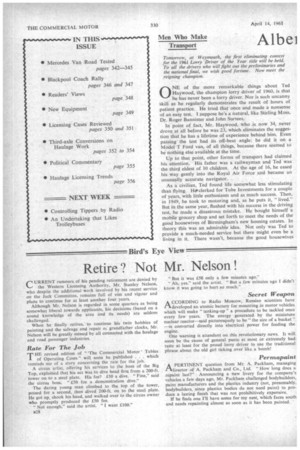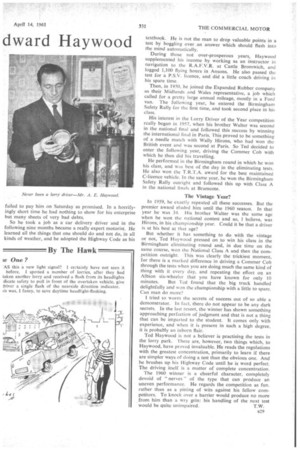Albel
Page 36

Page 37

If you've noticed an error in this article please click here to report it so we can fix it.
dward Haywood
ONE of the more remarkable things about Ted Haywood, the champion lorry driver of 1960, is that he has never been a lorry driver. Nor is such uncanny skill as he regularly demonstrates the result of hours of patient practice. He tried that once and made a nonsense of an easy test. I suppose he's a natural, like Stirling Moss, Dr. Roger Bannister and John Surtees.
In point of fact, Mr. Haywood, who is now 34, never drove at all before he was 23, which eliminates the suggestion that he has a lifetime of experience behind him. Even passing the test had its off-beat angle: he did it on a Model T Ford van, of all things, because there seemed to be nothing else available at the time.
Up to that point, other forms of transport had claimed his attention. His father was a railwayman and Ted was the third eldest of 10 children. At the age of 16, he eased his way gently into the Royal Air Force and became an unusually accurate navigator. .
As a civilian, Ted found life somewhat less stimulating than flying. Hdoclerked for Tube Investments for a couple of years, with little enthusiasm and as much success. Then, in 1949, he took to motoring and, as he puts it, "lived." But in the same year, flushed with his success in the driving test, he made a disastrous mistake. He bought himself a mobile grocery shop and set forth to meet the needs of the good housewives of Birmingham's new housing estates. In theory this was an admirable idea. Not only was Ted to provide a much-needed service but there might even be a living in it. There wasn't, because the good housewives
failed to pay him on Saturday as promised. In a horrifyingly short time he had nothing to show for his enterprise but many sheets of very bad debts.
So he took a job as a car delivery driver and in the following nine months became a really expert motorist. He learned all the things that one should do and not do, in all kinds of weather, and he adopted the Highway Code as his textbook. He is not the man to drop valuable points in a test by boggling over an answer which should flash into the mind automatically.
During those not over-prosperous years, Haywood supplemented his income by working as an instructor in navigation to the R.A.F.V.R. at Castle Bromwich, and logged 1,100 flying hours in Ansons. He also passed the test for a P.S.V. licence, and 'did a little coach driving in his spare time.
Then, in 1950, he joined the Expanded Rubber company as their Midlands and Wales representative, a job which called for a pretty large annual mileage, mostly in a Ford van. The following year, he entered the Birmingham Safety Rally for the first time, and took second place in his class.
His interest in the Lorry Driver of the Year competition really began in 1957, when his brother Walter was second in the national final and followed this success by winning the international final in Paris, This proved to be something of a needle match with Wally Hirons, who had won the British event and was second at Paris. So Ted decided to enter the following year, driving the Commer Cob with which he then did his travelling.
He performed in the Birmingham round in which he won his class, and was best of the day in the eliminating tests. He also won the T.R.T.A. award for the best maintained C-licence vehicle, In the same year, he won the Birmingham Safety Rally outright and followed this up with Class A in the national finals at Bramcote.
The Vintage Year?
In 1959, he exactly repeated all these successes. But the premier award eluded him until the 1960 season. In that year he was 34. His brother Walter was the same age when he won the national contest and so, I believe, was Hirons, in his championship year. Could it be that a driver is at his best at that age?
But whether it has something to do with the vintage or not, Ted Haywood pressed on to win his class in the Birmingham eliminating round and, in due time on the same course, won the National Class A and then the competition outright. This was clearly the trickiest moment, for there is a marked difference in driving a Commer Cob through the tests when you are doing much the same kind of thing with it every day, and repeating the effort on an Albion six-wheeler that you have known for only 10 minutes. But Ted found that the big truck handled delightfully and won the championship with a little to spare. Can man do more?
I tried to worm the secrets of success out of so able a demonstrator. In fact, there do not appear to be any dark secrets. In the last resort, the winner has shown something approaching perfection of judgment and that is not a thing that can be imparted to the student. It comes only with experience, and when it is present in such a high degree. it is probably an inborn flair.
Ted Haywood is not a believer is practising the tests in the lorry park. There are, however, two things which, to Haywood, have proved invaluable. He reads the regulations with the greatest concentration, primarily to learn if there are simpler ways of doing a test than the obvious one. And he brushes up his Highway Code until he is word perfect. The driving itself is a matter of complete concentration.
The 1960 winner is a cheerful character, completely devoid of "nerves" of the type that can produce an uneven performance. He regards the competition as fun. rather than as a pitting of wits against his fellow competitors. To knock over a barrier would produce no more from him than a wry grin: his handling of the next test would be quite unimpaired. T.W.
































































































































